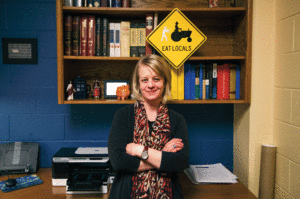Kelly Murphy ’01 may be an unofficial expert on zombies, but in the event of a zombie apocalypse she’d probably be one of the first people to get infected. “I’ve often joked with my students that the likelihood of a biblical studies scholar surviving the initial zombie outbreak is pretty slim,” she said.
Mary Washington’s 2001 Outstanding Graduate in Religion now teaches biblical studies at Central Michigan University, where her course From Revelation to the Walking Dead is an unqualified hit. The course encourages students to take a deeper look at apocalyptic themes in biblical texts, literature, and pop culture.

Assistant Professor Kelly Murphy teaches the popular class From Revelation to the Walking Dead at Central Michigan University.
“Adding zombies to a class about ancient apocalyptic literature is a kind of shameless trick designed to get students to sign up for a class that they might not otherwise be drawn to take,” Murphy admits. “Many students don’t know what the academic study of the biblical texts entails, so they don’t realize how exciting it can be.”
So what exactly do you study in a course that blends religion with the undead? A typical class might include “survivor exercises” such as analyzing films, building a board game that teaches the historical significance of the book of Revelation, or working with ancient texts and contemporary interpretations of them. Murphy encourages her students to question why and how writers throughout history have depicted the apocalypse, how we imagine people might react to such an event, and what zombies represent in books and movies.
“Zombies and other monsters tell us about ourselves – especially what we fear,” Murphy said. “But additionally, zombies, ancient apocalyptic texts, and the study of religion more generally allow us to wrestle with big questions: What does it mean to be human? What is the nature of suffering? What does it mean to be good or evil?”
Murphy’s own passion for religious studies began at Mary Washington’s Department of Classics, Philosophy, and Religion, where her most influential teachers included professors of religion James Goehring, Mehdi Aminrazavi, and David Cain, emeritus. “They inspired me on so many levels, from thinking about the problem of suffering and evil, to unraveling the history of the composition of the biblical texts, to reading scholars like Soren Kierkegaard and Al-Ghazzali,” she said, “which helped me to think about different religious contexts and different theologies and ways of understanding the world.”
Today, Murphy hopes to pass those lessons on to her own students, whether they’ll one day be faced with an apocalypse or something even more frightening. “I do think we have more pressing, real-world concerns to think about – like the environment, for example,” she said. “Our fears concerning those kinds of significant social issues get reflected and deflected into the narratives we see on television, movie screens, and literature. So I suppose my plan is to try to teach students to see these big issues as they’re hidden within our fictional stories.”
— By Erica Jackson Curran ’07
